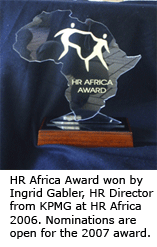 ReConnect Africa is a unique website and online magazine for the African professional in the Diaspora. Packed with
essential information about careers, business and jobs, ReConnect Africa keeps you connected to the best of Africa.
ReConnect Africa is a unique website and online magazine for the African professional in the Diaspora. Packed with
essential information about careers, business and jobs, ReConnect Africa keeps you connected to the best of Africa.


 A forthcoming summit - ‘Building Strategic HR Partnerships’ – will bring together leading HR practitioners from West Africa and beyond. To be held in Ghana in August 2007, the Summit will define a way forward to ensure solid HR business partnerships are created within their organisations through a Roadmap to HR Strategic Excellence framework.
A forthcoming summit - ‘Building Strategic HR Partnerships’ – will bring together leading HR practitioners from West Africa and beyond. To be held in Ghana in August 2007, the Summit will define a way forward to ensure solid HR business partnerships are created within their organisations through a Roadmap to HR Strategic Excellence framework. Strategic Human Resources The first challenge is to get HR practitioners to recognise what ‘strategic partner” means – for HR itself. The key word is “strategic”, which means inter alia planned, tactical, deliberate, premeditated and intentional. It denotes that the (HR) partnership that is forged must be well thought out and purposefully built on key business elements that will assist the business in achieving its objectives.
The first challenge is to get HR practitioners to recognise what ‘strategic partner” means – for HR itself. The key word is “strategic”, which means inter alia planned, tactical, deliberate, premeditated and intentional. It denotes that the (HR) partnership that is forged must be well thought out and purposefully built on key business elements that will assist the business in achieving its objectives.
So what is holding HR back? In many cases, businesses fail to recognise the strategic role that HR can play within the organisation. HR practitioners, themselves, also have to take some accountability for the poor image of HR - for despite the understanding by some practitioners that HR desperately needs to change, few know how.
The HR paradigm needs to shift and what is needed now is a guideline that spells out the way forward for HR and that describes the core elements of a ‘strategic HR alliance’.
Guideline 1: HR needs to understand the business
It is simply not enough for HR to understand what the business does. It is knowing how and why the organisation does what it does, that enables HR to fully understand the nature of the business. The organisation’s mission, vision and values; the business strategy; the business plan as well as the core business drivers need to be fully understood by HR.
Guideline 2: HR needs to be involved
HR needs to be fully involved – in all aspects of business functioning. A true HR professional understands all elements of the business, rather than just HR, and needs to be able to make meaningful contribution by adding significant business value (as a strategic business partner) rather than an administrative service.
Guideline 3: HR needs to be proactive
HR needs to proactively define what each business partner needs – from an HR perspective. Proactively set about meeting with key stakeholders to discuss their needs, both current and future. To do that well, HR needs to be able to talk through business issues in a way that reflects a good understanding of not only the business but also the available HR solutions.
Guideline 4: HR needs to be empowered
If HR is to be a strategic business partner, it stands to reason that HR needs to be fully empowered. It is imperative that HR is given the empowerment it needs to develop into a strategic business partner that controls and guides the management of employees. In return, HR practitioners must be able to show business intent for their decision-making.
Guideline 5: HR needs to use business as a backdrop
HR needs to learn to talk the business talk. This implies that HR must understand how to interpret HR data so that it is meaningful to the business and, conversely, how to take business information and interpret it so that it makes HR sense.
Guideline 6: HR needs to be professional
In order for HR to be identified by the business as a strategic partner, there needs to be a clearly defined standard by which practitioners operate. Organisations must demand from HR practitioners a certain level of functioning that leads to the entitlement of credibility in a business sphere. The debate whether HR should be professionalised or not rages on, but certainly there is a dire need for HR standards.
It is clear that the ideal HR business partnership is still a way off for many organisations. The time is right for HR practitioners to take a long, hard look at the way HR is positioned within their organisations and use these guidelines to start the metamorphosis that will lead HR out of the back-office and into the Boardroom.
Janine Nieuwoudt is Managing Director of BMT Dimensions in South Africa. Janine is one of the presenters at the HR West Africa Summit, which is hosted by the Institute for International Research and will be held at the Labadi Beach Hotel, Accra, Ghana from 20 – 22 August 2007. janinen@bmtdimensions.com
Further details about the HR West Africa Summit can be obtained at (27) (11) 771 7122 or at www.hr-africa.com/westafrica.
